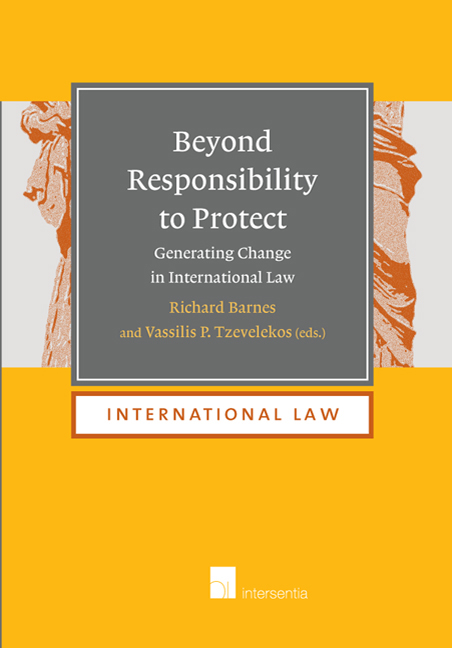Book contents
- Frontmatter
- Dedication
- Foreword
- Acknowledgements
- Contents
- Table of Cases
- List of Authors
- Introduction
- Part I The Moral Underpinnings and Political Ends of R2p
- Part II International Institutions And Their Role In R2p
- The Institutionalisation of the Responsibility to Protect
- The Responsibility Not to Veto Revisited. How the Duty to Prevent Genocide as a Jus Cogens Norm Imposes a Legal Duty Not to Veto on the Five Permanent Members of the Security Council
- The EU and the Responsibility to Protect: The Case of Libya, Mali and Syria
- Commentary: International Institutions and their Role in R2P
- PART III De Facto Regimes and Non-State Actors Within a State And as a State
- Part IV R2p and Due Dilligence Regarding the Conduct of Corporations
- Part V The Interaction Between R2p And Humanitarian Law Obligations To Protect Civilian Populations
- PART VI R2p and International Criminal Law Beyond the Four R2p Crimes
- Part VII R2p and its Possible Impact on the Law of International Responsibility
- Part VIII Concluding Observations
- Index
Commentary: International Institutions and their Role in R2P
from Part II - International Institutions And Their Role In R2p
Published online by Cambridge University Press: 19 September 2018
- Frontmatter
- Dedication
- Foreword
- Acknowledgements
- Contents
- Table of Cases
- List of Authors
- Introduction
- Part I The Moral Underpinnings and Political Ends of R2p
- Part II International Institutions And Their Role In R2p
- The Institutionalisation of the Responsibility to Protect
- The Responsibility Not to Veto Revisited. How the Duty to Prevent Genocide as a Jus Cogens Norm Imposes a Legal Duty Not to Veto on the Five Permanent Members of the Security Council
- The EU and the Responsibility to Protect: The Case of Libya, Mali and Syria
- Commentary: International Institutions and their Role in R2P
- PART III De Facto Regimes and Non-State Actors Within a State And as a State
- Part IV R2p and Due Dilligence Regarding the Conduct of Corporations
- Part V The Interaction Between R2p And Humanitarian Law Obligations To Protect Civilian Populations
- PART VI R2p and International Criminal Law Beyond the Four R2p Crimes
- Part VII R2p and its Possible Impact on the Law of International Responsibility
- Part VIII Concluding Observations
- Index
Summary
At the normative level international institutions have contributed to the development of the responsibility to protect (R2P), although its embodiment in the United Nations’ (UN) World Summit Outcome Document 2005 represented a weakening of the normative potential of R2P outlined only a few years earlier by the International Commission on Intervention and State Sovereignty (ICISS). Th at Outcome Document also continued the institutionalisation of R2P by making clear the centrality of the UNSC to R2P and confining regional organisations to a secondary role; in other words maintaining the hierarchy established in Chapters VII and VIII of the UN Charter. Nonetheless, despite the conservatism of the Outcome Document, R2P still has the potential to transform international law in ways which humanitarian intervention was unable to do, not only because of its combination of norms and institutions, but also because it commands a basic level of consensus in the UNGA in a way that humanitarian intervention did not.
In regard to the normative aspect, care must be taken to ensure that R2P transforms values and principles at the international constitutional level, but also that it does not undermine more established and detailed legal regimes that already serve to protect civilians from attacks. The UN's development of the two related regimes of R2P and the Protection of Civilians (POC) has potentially undermined the latter, which has a clearer normative base in international humanitarian law and is restricted, in the UN's documents at least, to POC in armed conflict (although UN peacekeepers are mandated to protect in other situations outside of armed conflict). Furthermore, some of the values underpinning international humanitarian law, especially of impartiality and neutrality, are not shared with R2P, where a failure to protect a civilian population leads to a loss of sovereignty and potentially results in an overtly partial response either by other states or the international community. R2P and POC, if kept apart normatively, could work together to protect civilians. Although this has been recognised by the UNSG in his recent reports on R2P, there is a tendency for the UN and other actors to conflate the two concepts thereby diminishing R2P's potential for transformative impact on the international legal order.
R2P is both normative and institutional and, as Nabil Hajjami's chapter shows, that institutional development is multi-layered.
- Type
- Chapter
- Information
- Beyond Responsibility to ProtectGenerating Change in International Law, pp. 147 - 152Publisher: IntersentiaPrint publication year: 2016



